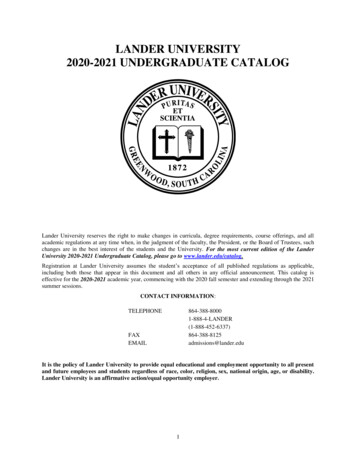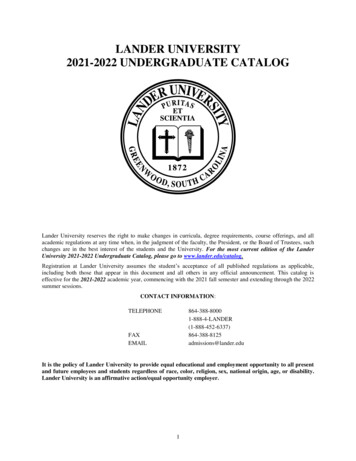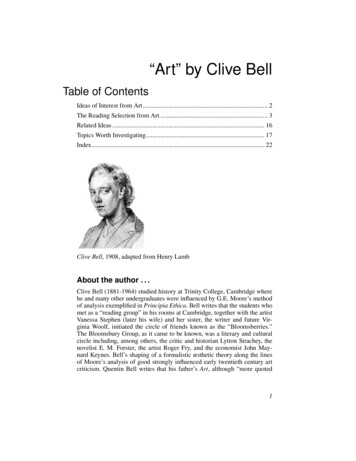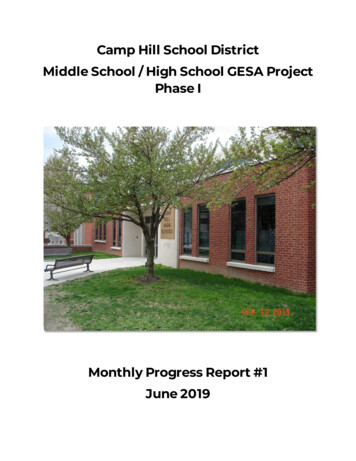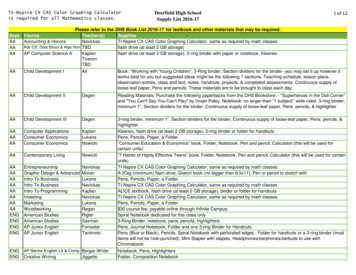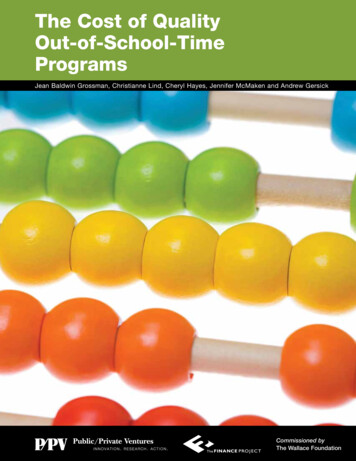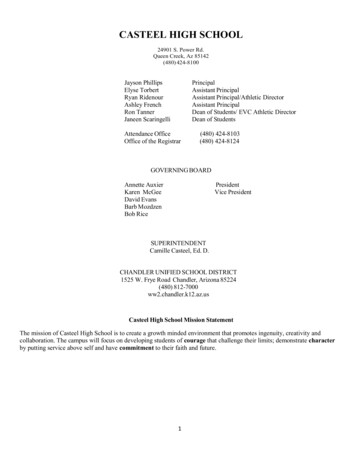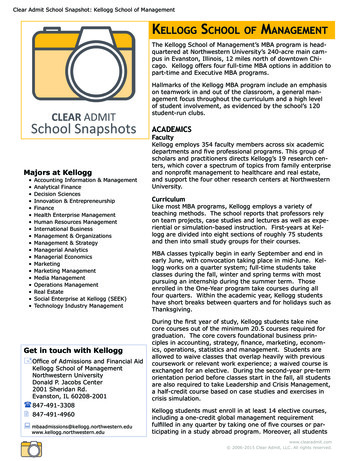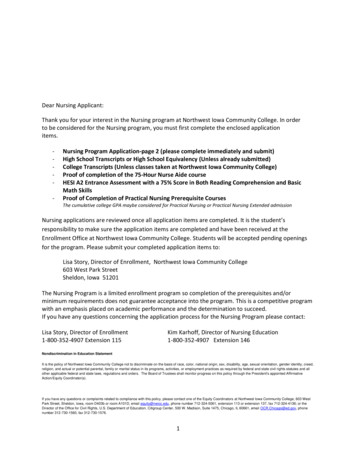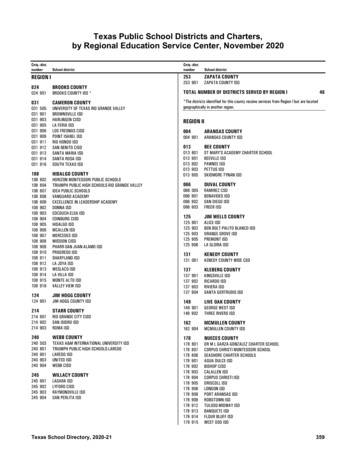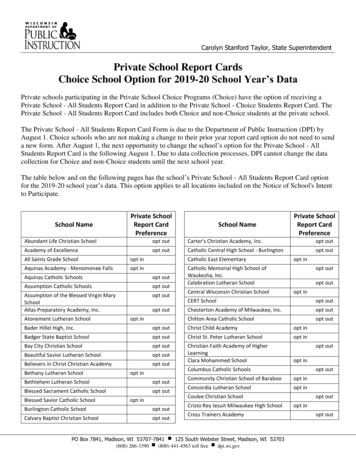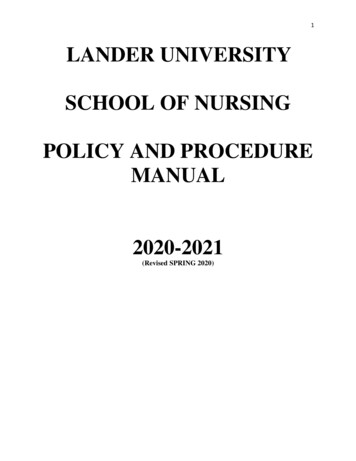
Transcription
1LANDER UNIVERSITYSCHOOL OF NURSINGPOLICY AND PROCEDUREMANUAL2020-2021(Revised SPRING 2020)
2Nursing Policy and Procedure Manual Attestation StatementAs part of professional accountability in nursing, all students (prelicensure and RN-BSN) areexpected to read the Nursing Policy and Procedure Manual each fall and spring semesters.Students are expected to read the entire manual upon admission to provisional status. Studentsare responsible for the content in the manual and for adherence to policies of the School ofNursing. Any questions regarding policies should be referred to the student’s assigned academicadvisor.My signature indicates my understanding and agreement with the above statement.SignPrintDateUpon receipt of this manual, tear out this form and turn in to the Dean of the School ofNursing.
3TABLE OF CONTENTSSECTION I: PHILOSOPHY AND CURRICULUM7PART A: PHILOSOPHYHISTORYACCREDITATIONMISSION STATEMENTPHILOSOPHY AND CORE VALUESVISIONSTANDARDS OF PRACTICENURSING CONCEPTUAL FRAMEWORKPROGRAM OUTCOMESSTUDENT OUTCOMESCONGRUENCE OF SON GOALS AND OUTCOMESCONGRUENCE OF SON GOALSCONGRUENCE OF SON MISSIONPART B: CURRICULUMCURRICULUM CHANGE PROCESSEXPERIENCE YOUR EDUCATION (EYE) PROGRAMLIBRARYCOLLECTION GUIDELINESFOUR YEAR MAJOR GUIDESPART C: NEUMAN SYSTEMS MODEL CONCEPTS AND DEFINITIONSPART D: GLOSSARY77777888991114161919192021232935SECTION II: ACADEMIC AND CLINICAL POLICIES AND PROCEDURES39PART A: ACADEMIC POLICIES AND PROCEDURESACADEMIC HONOR CODEADA REQUIREMENTPRELICENSURE NURSING MAJOR ADMISSION & PROGRESSIONADDITIONAL GUIDELINES FOR ADMISSION & PROGRESSIONREQUIREMENTS FOR GRADUATING WITH A BSN DEGREE (PRELICENSURE)ENDORSEMENT FOR NCLEX-RN EXAMINATION (PRELICENSURE)RN-BSN COMPMLETION OPTION FOR REGISTERED NURSESCORE PERFORMANCE STANDARDS AND REQUIREMENTS FOR NURSING STUDENTSATI PROCTORED ASSESSMENTSATTENDANCE REGULATIONSBEARCAT CREEDSTUDENT NURSE CODE OF CONDUCTCOPYING OF STUDENT RECORDSCOURSE GRADE PERCENTAGE ACCRUING FROM TESTINGCOURSEWORK APPROVALSCHOOL SPONSORED TRIPS3939393943434444465253545455555556
4DISCIPLINARY CODELANDER UNIVERSITY SCHOOL OF NURSING PROFESSIONAL CONDUCT POLICYGRADING SCALESENIOR RESEARCH SYNTHESISMEDICATION CALCULATION COMPETENCY POLICYPHYSICAL AND/OR MENTAL HEALTH CONCERNSSURGERIES AND OTHER PHYSICAL HEALTH CONCERNSREGISTRATION POLICIESMULTIPLE EXAM POLICYTEST/FINAL EXAM REVIEW POLICYUSE OF SCHOOL OF NURSING EQUIPMENTWITHDRAWAL FROM UNIVERSITYPART B: CLINICAL POLICIES AND PROCEDURESREQUIREMENTS FOR ENTERING CLINICAL NURSING COURSESCONFIDENTIALITY STATEMENTELECTRONIC DEVICES IN THE CLINICAL AREAPHOTOGRAPHY AND VIDEOGRAPHY IN CLINICAL/LABORATORY SETTINGSATTENDANCE AT NURSING LABORATORIES/CLINICALSMAKE-UP LABORATORY/CLINICAL EXPERIENCEILLNESS DURING LABORATORY/CLINICALRN-BSN CLINICAL LABORATORY EXPERIENCESPRELICENSURE CLINICAL/LABORATORY EVALUATIONLANDER UNIVERSITY SCHOOL OF NURSING SIMULATION LEARNING CENTER GUIDELINESCLINICAL NURSING SKILLS COMPETENCYCLINICAL NURSING SKILLS DURING OBSERVATION EXPERIENCES POLICYMEDICATION ADMINISTRATION POLICYCLINICAL PRACTICE GUIDELINESDRUG AND ALCOHOL POLICIESCLASS/CLINICAL/LABORATORY INCIDENT REPORTWORKMAN’S COMPENSATIONCLINICAL DRESS 697070707173767777SECTION III: STUDENT POLICIES AND PROCEDURES81PART A: PRELICENSURE STUDENTSADVISEMENTALCOHOL/DRUG USE AT NURSING SPONSORED EVENTSBILL OF RIGHTS AND RESPONSIBILITIES FOR STUDENTS OF NURSINGCLASS ADVISORSCLASS REPRESENTATIVESCOMMUNICATIONFINANCIAL ASSISTANCEHEALTH SERVICESNURSING CAPS POLICYPERMISSION TO COPY WRITTEN ASSIGNMENTSPROFESSIONAL BOUNDARIES POLICY818181818282828282828383
5NURSING POLICY AND PROCEDURE MANUAL ATTESTATION STATEMENTRECOGNITION CEREMONY POLICYREQUIRED PROGRAM EXPENSESRESOLUTION OF STUDENT PROBLEMS AND COMPLAINTSSMOKING AND TOBACCO USESTUDENT LAPTOP POLICYSTUDENT LOUNGESTUDENT NURSE ORGANIZATIONSSTUDENT’S RIGHT TO PETITIONSTUDY AREATRANSPORTATION8485868788888888898989SECTION IV: PROGRAM EVALUATION90INTRODUCTIONBELIEFSBSN NURSING ASSESSMENT PLANEXPECTED STUDENT OUTCOMESNCLEX-RN PROGRAM PASS RATECRITICAL THINKING ASSESSMENTPROGRAM GOALS AND OUTCOMESSTUDENT/ALUMNI FEEDBACKCOMMUNITY OF INTEREST FEEDBACKFACULTY GOALS AND OUTCOMESINSTITUTIONAL REPORTNEW COURSE REPORT-NURN/NURSONGOING FORMAT COURSE REPORT-NURN/NURSCOURSE EVALUATIONS90909193949494959596979899100SECTION V: FACULTY/ADMINISTRATIVE POLICIES AND PROCEDURES101NURSING FACULTY ORGANIZATIONCONSTITUTION AND RULES OF ORDERNURSING BOARD OF ADVISORSSCHOOL OF NURSING ORGANIZATIONAL CHARTFACULTY/STAFF POSITION DESCRIPTIONSFACULTY EVALUATIONFACULTY POLICIESCLASS ADVISORCLASS ADVISORS RESPONSIBILITIESCOPYINGCLINICAL ATTIRECLINICAL/LABORATORY EMPLOYMENT REQUIREMENTSWORKER’S COMPENSATIONDISTINGUISHED PROFESSOR AWARD101101106107108131132132132133134134135135
6NEW NURSING FACULTY ORIENTATIONOFFICE HOURSRESEARCH OF HUMAN SUBJECTSTEXTBOOK SELECTIONTRAVEL REQUESTWORK-STUDY STUDENT137140140140140140
7SECTION I: PHILOSOPHY AND CURRICULUMPart A: PhilosophyHistoryThe School of Nursing was established in 1957 as the first nursing program in South Carolina tooffer an associate degree. After graduating 632 nurses, the ADN program was replaced in themid-eighties with a Bachelor of Science degree program which has currently graduated over athousand nurses.AccreditationThe Bachelor of Science in Nursing program is approved by the South Carolina Board ofNursing for South Carolina (110 Centerview Dr. Suite 202, Columbia, SC 29210; phone: 803896-4550) and is accredited by the Commission on Collegiate Nursing Education, (655 K Street,NW, Suite 750, Washington, DC 20001; phone: 202-887-6791).Mission StatementLander University’s William Preston Turner School of Nursing is committed to preparingindividuals to provide holistic nursing care in a variety of settings to diverse clients across thelifespan. The purpose of the baccalaureate program is to prepare graduates within a liberal artsenvironment for the professional nursing roles of care provider, leader, consumer of research,candidate for advanced studies, and contributing member of the nursing profession. The purposeof the graduate program is to prepare clinical nurse leaders to address the healthcare needs of the21st century by implementing outcome-based practice through management of care systems,quality improvement strategies, utilization of technology, and advanced clinical reasoning.Philosophy and Core ValuesThe faculty of the Lander University School of Nursing believes that the theory-based practice ofprofessional nursing is founded on an evolving body of nursing knowledge supported by a strongliberal arts emphasis in behavioral, physical, and analytical sciences as well as the humanities.We further believe that personal education is a lifelong process that is built upon a broadknowledge-base and experience.The Lander University nursing program adheres to standards of practice established by theAmerican Nurses Association and the American Association of Colleges of Nursing as theyapply to individuals, families, groups and the community-at-large. The metaparadigm of person,environment, health, and nursing is integrated throughout the curriculum using the NeumanSystems Model as the conceptual framework for clinical practice.The nursing faculty value, teach, and role model the attributes of critical thinking, effectivewritten and oral communication, innovative clinical and technological skills, professionalism,
8and cultural competence. The faculty believes that students are responsible for their ownlearning; however, the faculty share a strong commitment to teaching, personalized facultyadvisement, mentoring and shared governance. Inherent in the faculty role in a liberal artsinstitution are responsibilities for professional development, as well as service to the university,profession, and community. In an effort to respond to issues generated by a changing healthcareenvironment, the School of Nursing remains competitive by partnering with area healthcareconstituents to address the critical needs of the region and state for baccalaureate nurses. Theseactivities support student success in the educational program and facilitate transition of studentsinto the nursing profession.VisionLander University’s William Preston Turner School of Nursing will be known globally foreducating well-rounded, professional nurses who provide holistic care and are committed to lifelong learning.Standards of PracticeThe Lander University nursing curriculum incorporates three sets of professional nursingstandards and guidelines: The Essentials of Baccalaureate Education for Professional NursingPractice (AACN, 2008), the American Nurses’ Association (ANA) Nursing: Scope andStandards of Practice (ANA, 2015), and the ANA Code of Ethics (ANA, 2015). Lander nursingalso incorporates additional standards, developed by the ANA in collaboration with otherprofessional associations, to support professional decision-making in specific areas of nursingsuch as psychiatric/mental health nursing and community/public health nursing.Nursing Conceptual FrameworkThe baccalaureate nursing curriculum at Lander University is based on the Neuman SystemsModel (Neuman, 1995). This model addresses the four concepts which are basic to the nursingprofession and the philosophical foundation of the Lander nursing curriculum: Person,Environment, Health, and Nursing. The Neuman Systems Model is wellness oriented, wholistic,open and dynamic. The model focuses on two components: the nature of the client’s response tostressors in the environment and the nurse’s intervention to assist the client to best respond tothose stressors.PersonThe client or client system may refer to an individual person, family, group, or community. Assuch, it is a dynamic composite of inter-relationships among five variables: (a) physiological, (b)psychological, (c) sociocultural, (d) developmental and (e) spiritual.EnvironmentThe client/client system is constantly exposed to environmental stressors that may alter thesystem’s stability. These are three types of stressors: (a) intrapersonal stressors – forces
9occurring within the client; (b) interpersonal stressors – forces occurring between one or moreclients’ and (c) extrapersonal stressors – forces occurring outside the client. If stressors areperceived by the client as strengthening factors, they are being viewed as positive and may resultin a beneficial outcome. If, however, stressors are perceived as detrimental to the well-being ofthe client’s system, they may disrupt the system’s equilibrium, and result in negative outcomes.HealthThe client possesses various lines of resistance and defense designed to promote health byprotecting against stressors and by maintaining stability of the system. The flexible and normallines of defense and the lines of resistance are protective mechanisms, which surround the clientsystem and respond to nursing prevention strategies in protecting the stability of theclient. When the protective mechanisms are all in place, the client system is well, stable, and inequilibrium. When the lines of defense and the lines of resistance are penetrated by stressors, theclient system’s survival is at risk.NursingThree types of nursing interventions are identified in the Neuman Systems Model. Primaryprevention is utilized as wellness retention strategy when a threat to health exists but no stressorinvasion has occurred. The goal of primary prevention is to retain the stability of the clientsystem. Secondary prevention is used for wellness attainment and provides appropriatetreatment after symptoms have occurred as the result of stressor invasion. In secondaryprevention, the system strives to attain stability. Tertiary prevention focuses on returning theclient system to wellness following treatment. The goal of tertiary prevention is to maintain anoptimal level of wellness by supporting existing strengths and the conservation of client energy.Program Outcomes1. Eighty percent (80%) of each cohort entering the traditional BSN option will graduate with aBSN within 10 semesters.2. The School of Nursing will maintain a program success rate on the NCLEX-RN licensingexam within 5% of the national mean.3. One hundred (100%) of Lander nursing graduates who seek employment in nursing will beemployed as registered nurses within six months of graduation.4. Students will demonstrate achievement in critical thinking ability at each level of the nursingcurriculum.Student OutcomesThe graduate of the baccalaureate nursing program will be prepared to:
101. Apply the nursing process according to Neuman Systems Model to promote an optimal levelof wellness through the use of primary, secondary, and tertiary prevention / interventionstrategies for individuals, families, and communities;2. Synthesize nursing theory with knowledge from selected other disciplines as a basis forcaregiving, communication, therapeutic interventions, and critical thinking and communicationin its broadest application.3. Use appropriate problem-solving approaches in varied settings to promote wellness for diverseclient systems;4. Demonstrate leadership strategies to advance nursing practice and the nursing profession;5. Utilize nursing research findings to improve the quality of evidenced-based nursing practice;6. Incorporate established standards of professional nursing as the foundation for own nursingpractice.
11Congruence of SON Goals and Outcomes with Lander Vision and MissionLU Strategic Plan Goals Vision SON Goalsand MissionLander University Vision: All GoalLander graduates are educated, #1Educatewell rounded and prepared to professionalcontinue their education ornurses forlaunch their careers. (Lander current andUniversity, 2016).future practiceto meethealthcareLander University Mission:Lander University offers high- needs, and toadvancedemand and market-drivenprofessionallyprograms to ambitious andtalented students in SouthCarolina and beyond. Theseprograms are delivered in arich liberal arts environment toproduce highly qualified andmarketable graduates. (LanderUniversity, 2016)SON OutcomesProgram OutcomesEighty percent (80%) of each cohort entering thetraditional BSN option will graduate with a BSNwithin 10 semesters.2. The School of Nursing will maintain a programsuccess rate on the NCLEX-RN licensing examwithin 5% of the national mean.3. One hundred (100%) of Lander nursing graduateswho seek employment in nursing will be employedas registered nurses within six months of graduation.4. Students will demonstrate achievement in criticalthinking ability at each level of the nursingcurriculum.Student OutcomesThe graduates are prepared to:Apply the nursing process within the NeumanSystems Model to promote an optimal level ofwellness through the use of primary, secondary, andtertiary prevention/ interventions for individuals,families, and groups.Synthesize nursing theory with knowledge fromselected other disciplines as a basis for care giving,communication, therapeutic interventions, andcritical thinking.
12Use appropriate problem-solving approaches invaried settings to promote wellness for diverse clientsystems.Demonstrate leadership strategies to advance nursingpractice and the nursing profession.Utilize nursing research findings to improve thequality of nursing practice.Incorporate established standards of professionalnursing as the foundation for own nursing practice.Lander University Vision: AllLander graduates are educated,well rounded and prepared tocontinue their education orlaunch their careers. (LanderUniversity, 2016)GoalFaculty Outcomes for Goal #2#2 Maintain anursing faculty Ninety percent (90%) of full time faculty who are incomplementat least the second year at Lander will achieve anthat achievesevaluation rating of “Satisfactory” on overallthe School of teaching for the academic year.Nursing missionthroughLander University Mission:Lander University offers high- excellence inteaching,demand and market-drivenNinety percent (90%) of full time faculty who are inadvising,andprograms to ambitious andat least the second year at Lander will achieve anrole modeling evaluation rating of “Satisfactory” on effectivenesstalented students in SouthCarolina and beyond. These professionalas an academic advisor.development.programs are delivered in arich liberal arts environment toproduce highly qualified andmarketable graduates. (LanderNinety percent (90%) of full time faculty will roleUniversity, 2016)model professional development each academic yearthrough attendance at professional conferences and
13Lander University Vision: AllLander graduates are educated,well rounded and prepared tocontinue their education orlaunch their careers. (LanderUniversity, 2016)seminars, completing graduate level courses, earningCEU’s, or demonstrating intellectual curiosity.Faculty Outcomes for Goal #3Goal#3 Maintain anursing faculty Ninety percent (90%) of full time faculty will meetcomplementthe University requirement that “over a six yearthat achievesperiod each faculty member (will) have at least onethe Landeractivity in each level and at least 10 total activities.”Universitymission throughLander University Mission:Lander University offers high- scholarship;practice; anddemand and market-drivenNinety percent (90%) of full time faculty who are inservice to the at least the second year at Lander will demonstrateprograms to ambitious andinstitution, the practice in accord with the School of Nursingtalented students in SouthCarolina and beyond. These community, and definition.the profession.programs are delivered in arich liberal arts environment toproduce highly qualified andmarketable graduates. (LanderNinety percent (90%) of full time faculty who are inUniversity, 2016)at least the second year at Lander will demonstrateservice in accord with the School of Nursingdefinition.
14Congruence of SON Goals with Lander University PillarsLander University PillarsHigh-Demand, Market Driven ProgramsSchool of Nursing GoalGoal #1The SON will educate professionalnurses for current and future practice to meethealthcare needs, and to advance professionally.Selective, Competitive Recruitment andGoal #2The SON will maintain a nursingEnrollment of Ambitious and Talented Studentsfaculty complement that achieves the School ofNursing mission through excellence in teaching,advising, and role modeling professionaldevelopment.Robust Student ExperienceGoal #2The SON will maintain a nursingfaculty complement that achieves the School ofNursing mission through excellence in teaching,advising, and role modeling professionaldevelopment.Graduates Who are Gainfully Employed orGoal #1The SON will educate professionalAdmitted to Graduate Schoolnurses for current and future practice to meethealthcare needs, and to advance professionally.Advancement Activities Leveraged to Further the Goal #3 The SON will maintain a nursingUniversity’s Mission.faculty complement that achieves the LanderUniversity mission through scholarship; practice;and service to the institution, the community, andthe profession.Engaged and Supportive AlumniGoal #1The SON will educate professionalnurses for current and future practice to meethealthcare needs, and to advance professionally.Financially Stable and Operationally EfficientGoal #3 The SON will maintain a nursingfaculty complement that achieves the LanderUniversity mission through scholarship; practice;and service to the institution, the community, andthe profession.Facilities Positioned for Growth and EfficientUtilizationGoal #3 The SON will maintain a nursingfaculty complement that achieves the LanderUniversity mission through scholarship; practice;and service to the institution, the community, andthe profession.
15Employer of ChoiceHighly-Valued Community PartnerGoal #2The SON will maintain a nursingfaculty complement that achieves the School ofNursing mission through excellence in teaching,advising, and role modeling professionaldevelopment.Goal #3 The SON will mai
Lander University’s William Preston Turner School of Nursing is committed to preparing individuals to provide holistic nursing care in a variety of settings to diverse clients across the lifespan. The purpose of the baccalaureate program is to prepare graduates within a liberal arts
